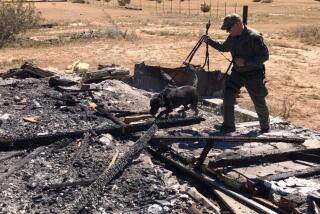Defense Expert Says Infant Was Dead Before Rat Bit Him
- Share via
FULLERTON — A 4-month-old boy, bitten more than 100 times by a pet rat, was dead before the animal attacked him, a forensic pathologist for the defense testified Wednesday.
Dr. Thomas Henry, the chief medical examiner for the coroner’s office in Denver, disputed the conclusion of Orange County’s deputy coroner who said the boy bled to death as a starving rat was feasting on his arm.
“It’s my opinion that the baby was dead at the time he received the (rat bite) injuries,” said Henry, who said he believed Steven Giguere Jr. died of sudden infant death syndrome, or SIDS.
The boy’s parents, Kathyleen and Steven Giguere Sr., are on trial in Superior Court for involuntary manslaughter and child endangerment in the death of their son last August and face up to six years in prison if convicted.
Prosecutors contend that the Gigueres, who were homeless and living in a filthy, trash-strewn station wagon, were criminally negligent by allowing the rat--who had a history of biting people--to roam free in the car.
The couple was not around when the rat sank its teeth into an artery in the baby’s hand causing him to bleed to death, prosecutors allege.
But Henry rejected that scenario, testifying that photographs of the dead boy, depicting the skin color around the bite marks, are inconsistent with bleeding to death. Henry said there were also signs of blood pooling, which indicated the boy may have been dead prior to the rat attack. Additionally, Henry said, blood and skin samples taken from the baby lacked certain chemical reactions that generally occur when a body bleeds to death.
Under cross-examination, however, Henry conceded that the rat bites were severe enough to cause the baby’s death.
Henry, the first witness in the defense’s case, also acknowledged that the baby lacked several of the telltale medical signs found in more than 80% of SIDS cases. SIDS is a mysterious condition that takes the lives of apparently healthy infants.
Expressing incredulity, Deputy Dist. Atty. Jim Tanizaki asked Henry if he thought “it was just a coincidence” that the baby died of SIDS and then immediately was attacked by the rat. “Is that your opinion?” he asked
“I think that’s what happened,” Henry responded.
An expert on rats also testified, saying that a rodent, even a starving one, may not have been able to continually bite a live baby.
William B. Jackson, a professor of ecology from Bowling Green University in Ohio, said rats would be deterred from striking anything that moved or even cried or screamed around them.
“If there’s any motion . . . that’s going to disturb the rat and cause it to retreat,” Jackson said. “It the motion was frequent it might discourage feeding altogether.”
More to Read
Sign up for Essential California
The most important California stories and recommendations in your inbox every morning.
You may occasionally receive promotional content from the Los Angeles Times.









